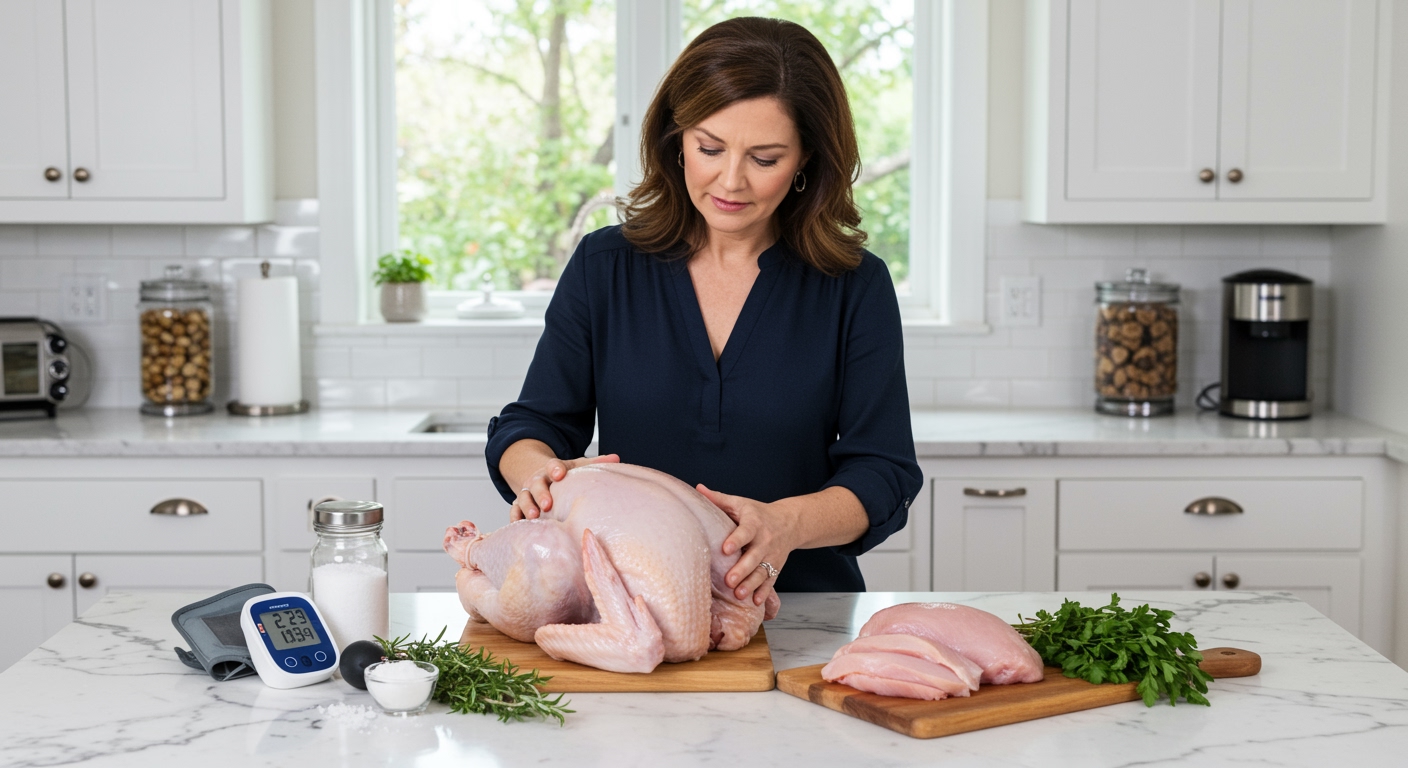✪ Key Takeaway: Turkey is generally safe for hypertensive patients when prepared without excess sodium and consumed as part of a balanced diet.
Introduction
You walk down the meat aisle and see turkey calling your name, but your blood pressure monitor at home makes you second-guess every food choice.
Many people with high blood pressure wonder if turkey is safe because they hear conflicting advice about protein choices and sodium content.
Hi, I’m Abdur, your nutrition coach and today I’m going to explain exactly how turkey affects your blood pressure and whether you should include it in your heart-healthy diet.
What Makes Turkey Different From Other Meats?
Turkey stands out as a lean protein source that naturally contains less saturated fat than red meats like beef or pork.
A 3-ounce serving of skinless turkey breast contains only about 1 gram of saturated fat compared to 6 grams in the same amount of ground beef.
The protein content in turkey helps your body maintain muscle mass while supporting healthy blood vessel function.
Turkey also provides important nutrients like potassium and magnesium that work together to help regulate blood pressure naturally.
These minerals help your blood vessels relax and counteract the effects of sodium in your diet.
The amino acid profile in turkey supports the production of nitric oxide, which helps keep your arteries flexible and blood flowing smoothly.
✪ Fact: Turkey breast contains about 25 grams of protein per 3-ounce serving with minimal sodium when prepared fresh.
How Does Processing Change Turkey Safety?
Fresh turkey from the butcher counter poses minimal risk for hypertensive patients when prepared properly at home.
However, processed turkey products like deli meats, turkey bacon, and pre-seasoned turkey contain significantly more sodium.
A single slice of deli turkey can contain 300-500 milligrams of sodium, while the same amount of fresh turkey has only 50-70 milligrams.
The curing process used in processed meats adds sodium nitrates and other preservatives that can affect blood vessel function.
These additives cause your blood vessels to constrict temporarily, which can raise blood pressure in sensitive individuals.
Smoked turkey often contains even higher sodium levels because salt is used both for flavor and preservation during the smoking process.
Your safest bet is choosing fresh, unprocessed turkey and seasoning it yourself with herbs and spices instead of salt-based marinades.
✪ Pro Tip: Always check nutrition labels on turkey products and aim for less than 140mg sodium per serving.
What Cooking Methods Work Best?
The way you prepare turkey makes a huge difference in how it affects your blood pressure.
Grilling, baking, or roasting turkey without added salt allows you to control sodium intake while preserving the natural flavors.
Avoid frying turkey in oil or butter, which adds unnecessary saturated fat that can worsen cardiovascular health over time.
Using herbs and spices like garlic, rosemary, thyme, and black pepper enhances flavor without increasing sodium content.
Garlic specifically contains compounds that help relax blood vessels and may provide additional blood pressure benefits.
Marinating turkey in lemon juice, vinegar, or wine-based mixtures adds flavor while the acids help tenderize the meat naturally.
Remove the skin before cooking to eliminate excess saturated fat that could negatively impact your cholesterol levels and overall heart health.
✪ Note: Cooking turkey to 165°F internal temperature ensures safety while maintaining nutritional benefits.
How Much Turkey Can You Safely Eat?
Most hypertensive patients can safely include 3-4 ounces of turkey in their daily meal plan without concerns.
This portion size provides about 25 grams of high-quality protein while keeping sodium intake reasonable when using fresh turkey.
Eating turkey 2-3 times per week fits well within heart-healthy dietary patterns like the DASH diet recommended for blood pressure management.
Balance your turkey meals with plenty of vegetables, whole grains, and fruits to maximize the potassium and fiber that support healthy blood pressure.
If you take blood pressure medications, turkey should not interfere with their effectiveness when consumed in normal amounts.
However, consistency matters more than perfection, so aim to maintain similar protein intake patterns from day to day.
Monitor your blood pressure regularly and note any patterns related to your food choices to understand how your body responds to different proteins.
✪ Fact: The DASH diet recommends 6 ounces or less of lean meat, poultry, or fish daily for optimal blood pressure control.
What About Turkey During Special Occasions?
Holiday turkey dinners often involve higher sodium preparations that require extra caution for hypertensive patients.
Traditional turkey brines and gravies contain substantial amounts of salt that can temporarily spike blood pressure readings.
If you are hosting, consider preparing your turkey with herb-based seasonings instead of salt-heavy brines or rubs.
When attending gatherings, focus on the plain roasted turkey meat and skip heavily seasoned stuffing or gravy that accompanies it.
Take smaller portions of turkey and fill your plate with vegetables, salads, and other lower-sodium side dishes available.
Stay hydrated throughout special occasions because adequate water intake helps your kidneys process excess sodium more effectively.
Remember that one high-sodium meal will not cause permanent damage, but returning to your regular eating pattern quickly helps maintain long-term blood pressure control.
✪ Pro Tip: Bring a heart-healthy side dish to gatherings so you have at least one safe option available.
The Bottom Line
Turkey is not only safe for hypertensive patients but can actually support your blood pressure management goals when prepared thoughtfully.
The key to eating well with high blood pressure is not avoiding foods but choosing the right preparation methods, and turkey exemplifies this principle perfectly.
I would love to hear about your experiences with turkey in your diet or any questions you might have about making heart-healthy protein choices in the comments below.
References
At NutritionCrown, we use quality and credible sources to ensure our content is accurate and trustworthy. Below are the sources referenced in creating this article:
- Healthy Turkiye: Hypertension Treatment Turkey
- Turkish Ministry of Health: Improvement of Blood Pressure Control in Turkey 2021
- Entriva: Turkey Health and Safety





